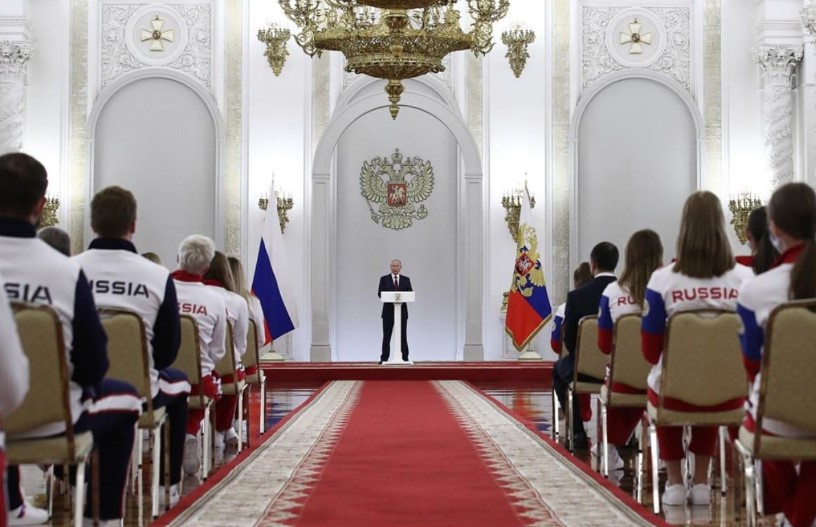Almost half of the medals won by Russian athletes at the Tokyo Olympics were won by members of the Russian army or police. Public calls for Russia and its athletes to be excluded from the Paris Olympics have been followed by the International Olympic Committee’s decision to allow them to participate as “neutral athletes” – a decision that is also being opposed by some 30 leading countries, such as the UK, France, the USA, and others. Slovenia, however, is not among them.
“We have strong concerns on how feasible it is for Russian and Belarusian athletes to compete as ‘neutral’ athletes when they are directly funded and supported by their states,” the aforementioned countries wrote in a letter to the International Olympic Committee, adding, “We urge the International Olympic Committee to consider these factors in cooperation with all countries and to reconsider its proposal. Until there is full clarity on the issue of ‘neutrality’, we do not support the return of athletes.”
Allowing the athletes to perform as “neutral” athletes would not be a sanction of any kind, as it would probably not be much different from the performances of Russian athletes we have seen so far. They were also not allowed to perform under the Russian flag or coat of arms at the Tokyo Olympics because of the doping scandal. The uniforms they ended up wearing were not very different from the uniforms they would have worn in the absence of sanctions, with the exception of the coat of arms.
The uniforms had the emblem of the Russian Olympic Committee sewn on instead of the national emblem.
The Ukrainians have announced a boycott of the Games if the scenario in which Russian athletes would perform as neutral competitors were to become a reality. The idea of a joint boycott has not yet been realised, but it supposedly has the most support in Estonia and Poland, AFP reports.
As the Office of the President of Ukraine said some time ago, there is a real danger that, if Russian athletes were to compete in the Olympic Games, war propaganda would be spread, which is completely contrary to the Olympic spirit. “If representatives of a terrorist state are going to take part in international sporting competitions or the Olympic Games, will it matter if they are there without their national symbols? The very presence of representatives of a terrorist state is a manifestation of violence and lawlessness,” the Ukrainian President expressed his concern some time ago.
Zelensky then warned that many Russian athletes have a military or other (special) rank and that Russia wants to use the world’s attention for its own war propaganda, or that Russian athletes could even be forced to engage in some kind of propaganda act: “If, God forbid, the Olympic principles are destroyed, and Russian athletes are allowed to take part in any competitions or the Olympics, it is only a matter of time when the terrorist state will force them to submit to war propaganda.”
Funding professional athletes through military employment is not uncommon, and Slovenian Olympic medallists have also worn (or continue to wear) military uniforms. The affiliation of Russia’s top athletes to the military is no secret in Russia, either – quite the contrary. The Russian national team at the Tokyo Olympics had 355 competitors. Of these, 109 athletes were from the army’s central military club, and 50 athletes were directly part of the military personnel.
Slovenia is not among the opponents
Regardless of the Prime Minister’s recent statements rejecting calls by Milan Kučan, the last Chairman of the Central Committee of the League of Communists of Slovenia, for Ukraine to surrender immediately, Slovenia is not among the countries calling on the International Olympic Committee to reconsider. We have already written about this in one of our previous articles.
Wondering why Slovenia is not part of the group of countries opposing Russia’sappearance at the Olympic games, we sent the following questions to the Slovenian Ministry of Foreign Affairs and the Slovenian Olympic Committee at the beginning of last week:
“As you know, a coalition of 35 countries (among them the entirety of the Western world – including the countries of the so-called core Europe, which you have pledged to work towards) has formed to call for a ban on Russian and Belarusian athletes participating in the Olympic Games. The countries’ arguments are that the vast majority of Russian athletes are also professional soldiers and that they actively support Russian aggression against Ukraine. Will Slovenia join the growing list of countries in question?
If Slovenia does not intend to do so, what are the arguments against such a decision, and how do you comment on the accusations that we are distancing ourselves from our Western allies and, above all, from nuclear Europe, and are moving closer to the Russian Federation and Belarus?”
We have not received a reply yet.
Gal Kovač


